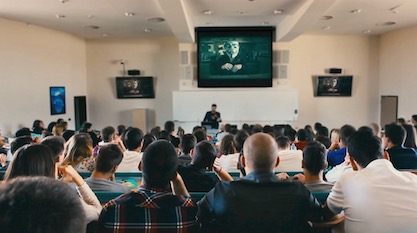 Evolution
Evolution
 Intelligent Design
Intelligent Design
Science Uprising — Not Confined to a Science Lab

We may think that we’re untouched by trends in thinking that go on far away. In a science lab or a science classroom, for instance. But that’s wrong.
I was reading blogger Rod Dreher’s report on a visit to Auschwitz. Think of this. Most of us know about the soap made from human fat, the lampshades from human skin, and other horrors manufactured from the remains of victims. Dreher quotes historian Norman Davies: “Hair mattresses, bone fertilizer, and soap from human fat were delivered to German industry with Prussian precision.” I hadn’t really imagined this before: living somewhere far away, Germans knew that Jews and others were being “deported to the East.” Perhaps they didn’t like what they heard about persecutions. But ultimately they could shrug. After all, it would never touch them personally. Meanwhile, unknowingly, they slept on mattresses filled with human hair, fertilized their vegetable gardens with burnt human bones, and bathed themselves with soap made from human fat.
A Bare Element of Parallel
You cannot meaningfully compare anything with the Nazi death camps. But I am struck by this bare of element of parallel. Materialist thinking dominates origins science. It permeates the rest of the culture through the prestige that academia and the media confer on it. A lot of otherwise thoughtful people look at that and shrug. They may not like it. But it doesn’t seem to touch them personally. Yet that’s where they are wrong. Knowingly or unknowingly, we all bathe in it.
That’s one of the messages of the Science Uprising series. The toxic materialism delivered with Prussian precision, by the media, by scientists, by other trusted figures in the culture, undermines our most precious values and commitments. Don’t shrug! Take time to think critically, as you think critically about other things. Rebel at the smug, influential assurances that, as cosmologist Lawrence Krauss says in Episode 4, “There is no evidence of design or purpose to our universe.” Watch any episode and see what I mean. They’re all about seven minutes long.
The Meaning Beyond Science
Our mathematician colleague Granville Sewell writes at The American Spectator about Science Uprising. He neatly summarizes the scientific meaning of materialism: “The bottom line is that materialists have to believe… that four fundamental, unintelligent, forces of physics alone could have rearranged the fundamental particles of physics on Earth into computers and airplanes and science libraries and Apple iPhones.” But what of the meaning beyond science?
Most of the articles at The American Spectator are about politics, from a conservative point of view. It’s not an audience guaranteed to appreciate the urgency of the issues tackled in the series. With these readers in mind, Sewell explains, “Political views are ultimately derived from philosophical views, and political revolutions are usually preceded by philosophical revolutions. Currently, a revolution with philosophical implications is taking place in the scientific world.”
I never stop being amazed at how many people, who ought to get it, shrug at the implications of scientific debates for the topics they care most about. Thanks to Professor Sewell for pointing out that from science flows philosophy and from philosophy flows politics, among other things. A revolution in science, whether the Darwinian one of the past or the intelligent design revolution of the present, will not confine itself within the walls of the science lab. It flows outward. For better or worse, in ways that degrade human beings or uplift us, we are bathing in it.
Photo: A scene from Science Uprising.
